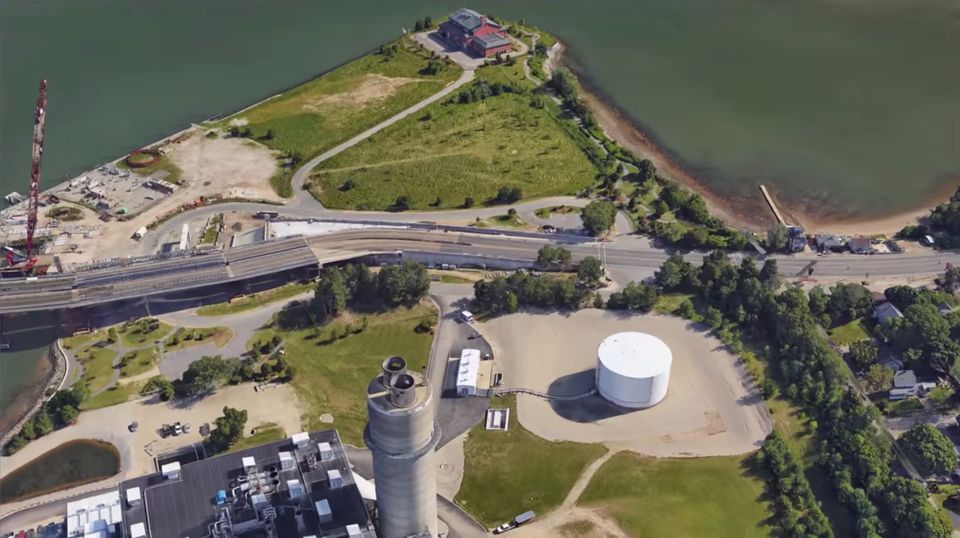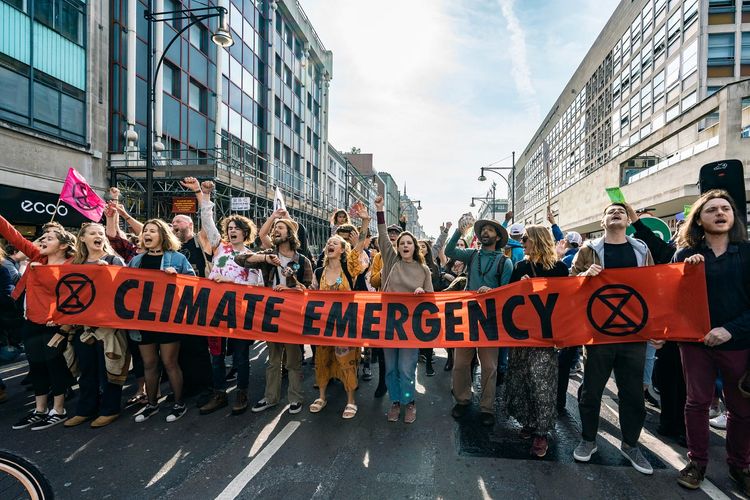Podcast: All Eyes on Weymouth as FERC Signals Interest in Environmental Justice

Local activists and legislators have been fighting the Enbridge natural gas compressor in Weymouth for years. It’s too close to residents and businesses, and poses too many health risks to a community that’s already borne the burden of too much pollution, they say. The project was approved by FERC in 2019, built and became operational in 2020. Then it had an emergency shutdown. And another. Now FERC is considering the unprecedented move of re-thinking its permit, a decision that could have broad ramifications.
Check out Miriam Wasser’s ongoing reporting on this at WBUR
Transcript
Amy Westervelt: Early last year, I started hearing from some activists in Massachusetts about a natural gas project proposed in their town. One woman in particular really thought this was something I should look into.
Her name is Andrea Honoré.
Andrea Honoré: But it took me a good year to understand what was going on. I’d never heard of a compressor. I’d never heard of FERC. I didn’t understand the process.
Amy: Andrea lives in the town of Weymouth, Massachusetts, a coastal town of around 50000 people in the South Shaw region, about half an hour south of Boston. And in 2015, Spectra Energy, a gas company from Texas, wanted to put what’s called a natural gas compressor right on the water at the north end of town. Natural gas needs a little help to travel the whole length of a pipeline and compressor stations help to sort of goose the gas along the way. If you’ve never heard of these things, it’s probably because they usually don’t put them in the middle of cities or even heavily populated areas, period. They’re generally placed on the middle of nowhere because they explode sometimes.
Local news montage: Also breaking overnight in Greene County, an explosion at a compressor station in Sycamore had firefighters busy battling flames on Hopkins’ Run Road.
We’re continuing coverage tonight on an explosion that took place earlier today, according to the Monahan’s volunteer fire department. One person has died and two others have been flown out with burn injuries.
Coverage on news by the 10 starts right now, like breaking into a gas line. Rupture leads to a big fire and explosion in Logan County.
Now we’re joined by the Guthrie fire chief, Eric Harlow, who is on the scene there. Chief, what happened out there exactly?
Well, guys, it appears that we had an explosion at a gas compressor plant..
Amy: But Spectra wanted to put the Weymouth compressor in a very populated area right at the foot of a heavily trafficked bridge. Here’s Honoré again.
Andrea Honoré: But at the time, Spectra Energy offered my little town forty seven million dollars to drop official opposition. That’s a lot of money.
Amy: She had become somewhat known in the community as an advocate for school funding. So when she raised some concerns to the mayor about taking that money, he was surprised.
Andrea Honoré: But he called and he’s like, well, what did the schools, you know, your school advocate, wouldn’t it be really great to have that money for the schools? And I’m like, well, yeah, if you want to be a one term mayor, go ahead, take the money. Like, that’s not this is absolutely not. No, there’s no amount of money there would. So, you know, he eventually asked around, did his thing crawling up his ass. It got more and more public protests and this and that. And so he was like, no, we’re not going to take money.
Amy: By that point, Honoré had learned about the potential impacts of the compressor from a local group called Four River Residents Against Compressor Station or FRRACS for short.
One of the criticisms of the station is that it would be sited at the foot of the Fort River Bridge. Like I said, that’s a major commuter bridge. So an explosion there, depending on the time of day, could do some serious damage. Alice Arena is the president of FRRACS.
Alice Arena: I kind of got into a little bit and I thought, oh, hell no, how could they put something like this on this little tiny piece of land so close to this brand new bridge, so close to a sewage pumping station? I mean, it just was madness and it made no sense.
Amy: A lot of people felt that way. And opposition to the project started to grow over 2015 and 2016. Patrick O’Connor is from Weymouth today. He’s a state senator. But six years ago, he was a city council president in Weymouth.
Patrick O’Connor: You know, this is going to be in a large population center, the gateway really to two major cities in the Commonwealth of Massachusetts, Quincy and Weymouth. And it’s going to be located next to a brand new bridge that through the state and federal government we spent over 300 million dollars on.
So, you know, tens of thousands of commuters travel by this compressor station every single day. So it’s not it’s not the typical location for one of these compressor stations. That’s one that was one of the major things that we first sort of looked at and thought this is unusual to be placed in in an area where there’s so much activity, both residential and commercial, that was the real catalyst to fight it. And then from there, in the research that we’ve done and in talking with other communities and other stakeholders, you know, we’ve identified a whole host of other things that are wrong with these compressor stations and why they shouldn’t be in areas where people are are regularly congregating.
Amy: One thing O’Connor learned about was a process called a blowdown that happens at compressor stations.
Patrick O’Connor: So they’re basically using thousands of chemicals now to extract from the shale this natural gas. And as it’s going through these compressor stations, one of the other components is that it’s feeding this gas up and it’s taking some of those byproducts out of that gas. And then those byproducts are captured at the station. And then every so often, you know, they were saying monthly or quarterly. But realistically, when you read their filings, it happens about two or three times a week. They’ll take all that byproduct and released into the atmosphere.
Amy: That seems like a potential problem for a lot of reasons, but it also has a big immediate negative side effect for people living nearby. It stinks.

Patrick O’Connor: They said it smells like rotten eggs.
Amy: Last fall, it seemed like this six year fight was over. The compressor and the pipelines that connect to it are owned by Canadian energy giant Enbridge now, they’re the same folks that owned the Line 3 pipeline you’re hearing a lot about in Minnesota. The Weymouth Project got its final permits in 2019, started construction, and in September it was ready to start operating.
Normally, that’s where this story would end. Maybe the activists would launch a lawsuit and it would be an uphill battle and it would probably take years. That’s not what happened here, at least not yet. There was an election in January, you may remember, and that meant a change up at the Federal Regulatory Commission that governs projects like this, the Federal Energy Regulatory Commission or FERC. If you listen to this podcast or you know me in real life, you know, I love to nerd out on a good FERC story. Generally, I try not to bore other people with them, but buckle up, because today we’re going to enjoy the rarest of things, a truly dramatic FERC story. And it could have huge implications, not just for the folks Weymouth, but for other people living near natural gas infrastructure and for this country’s progress on climate action in general. All that coming up right after this quick break. I’m Amy Westervelt and this is Drilled.
[music]
Activists like Andrea and Alice have been trying to get national reporters to pay attention to what’s happening in Weymouth for years, and so has Miriam Wasser, an environmental reporter with WBUR, Boston’s NPR News station. Last month, something happened that made people outside of Massachusetts sit up and take notice.
Miriam Wasser: It is now suddenly like this, this big issue that gas companies all over the country are paying attention to. And and one person I talked to just had this great line where he was like, Miriam, this is the Weymouth Compressor’s Dakota Access Pipeline moment.
Amy: That might be a stretch, but who knows? Here’s what’s been happening in Weymouth since last fall: So, like I mentioned before the break, despite a lot of pushback for years from local activist groups, the compressor station got its permits and started operating in September.
And then almost immediately…
Miriam Wasser: They had an emergency shutdown. Turns out this O-ring gasket failed and it wasn’t supposed to be used in this situation. But anyways, workers had to manually shut down part of the facility. And in the process, they vented a lot of natural gas into the area.
Amy: People were pretty freaked out, especially the people who had been worried about this project from the beginning and said everything’s fine. The emergency system worked like it should. We fixed a small maintenance issue and were back in business two weeks after that shutdown, FERC says, OK, you’re good to go. Here’s your final final permit. Now, keep in mind, this is still the Trump administration’s FERC, which was extremely pro oil and gas. The head of the commission at the time was Neil Chatterjee, Mitch McConnell’s energy adviser.
Miriam Wasser: And then six days later, the Weymouth compressor has a second emergency shutdown.
This time it’s I there was some sort of loss of power to the emergency shutdown system. And it basically I mean, it did what it’s supposed to do it right. It it lost power.
It triggered itself to shutdown, but again, vented a lot of natural gas into the area.
And people were so alarmed and a number of our congressional delegates were really alarmed and they reached out to the federal government.
Amy: That triggered an investigation from the federal government, specifically from the Pipelines and Hazardous Materials Safety Administration, or PHMSA. The investigation kicked off in October, effectively pausing all activity at the Weymouth compressor. And activist groups and local legislators took that opportunity to appeal to FERC to say, hey, this is what we said was going to happen. Now it’s happened. You need to rethink this. Here’s State Senator Patrick O’Connor again.
Patrick O’Connor: There was almost an immediate emergency shutdown. And then right after that, there was another one when they started to get up and running again. And no one could have made a better case for why that compressor station shouldn’t be there. And the company themselves, by having those malfunctions happen.
Amy: I should mention that O’Connor is a Republican. And this is something that I see over and over again, that when it comes to national discussions in D.C., a lot of times debates around natural gas and oil and other kinds of fossil fuels are kind of in the abstract. At the local level, these things are not partisan. When there is a pipeline or a compressor station in your district causing potential harm to your constituents, all of a sudden it seems very clear that it’s something that you might want to do something about. And O’Connor is very frank about what he thinks FERC should be doing in situations like this.
Patrick O’Connor:You know, seeing regulatory commissions that have all this authority and power make decisions based on what the industry wants them to do. That practice as a whole, whether it’s in health care or energy or education or wherever it is, just has to end. And it’s been going on for far too long down in D.C. So, yes, I would hope that not just for, you know, but other agencies see that people are paying attention more than they’ve ever been paying attention to what’s going on down in our federal government and that we need to actually look out for our taxpayers, look out for our neighbors and, you know, not just rubber stamp these projects and these initiatives that big, big corporations put forward.
Amy: OK, so the Weymouth compressor was temporarily paused in October. There was this federal investigation going on.
Legislators and activists were appealing to FERC. And then FERC did something kind of weird. They initially declined to rehear the arguments about the way with a compressor, but they didn’t completely shut the idea of a rehearing down. Oh, FERC, you inscrutable beast. Here’s Alice Arena with FRRACS again.
Alice Arena: They had to either give us the hearing or they had to deny it, they didn’t have a choice. So they denied it on November twenty third but said but you know, maybe we’ll think about this later. So it was it was a nondenial denial. It was kind of crazy. In December at the commission meeting on December 17th, I believe we were on the docket for on the agenda for this meeting. And we’re like, we don’t even know what it is that they’re talking about. But they were talking about the denial, apparently.
Amy: At the December meeting, they decided to table the denial discussion until January.
Alice Arena: So the January meeting on January 18th. Three of the commissioners, Chatterjee, Glick and Clemens, voted to deny the denial. Double negative. And so we said, well, gosh, that’s wonderful, you denied the denial, but you didn’t give us the hearing. So what what can we do? So Fracks started a campaign with our allies, you know, across the state and our members, the state delegation and our federal delegation. And we went after FERC on the docket and said, you have to give us the rehearing. You you can’t you know, you’ve got to either deny it or or or approve it one or the other.
Amy: Now, by this point, Biden has been inaugurated and a guy named Richard Glick had been appointed the head FERC commissioner. And this seemed like a big deal to climate activists because Glick has been very outspoken about the fact that he thinks FERC ought to be considering environmental justice and climate impacts when they evaluate things like pipelines and compressor stations.
Miriam Wasser: What was like super surprising is after this meeting, Commissioner Richard Gleick got on Twitter and he said, quote, The Waymouth compressor station raises serious environmental justice questions, which we need to examine. The communities surrounding the project are regularly subjected to high levels of pollution, and residents are concerned emissions from the station will make things worse. In three years at FERC, I’ve seen little more than lip service paid to environmental justice. This needs to change.
And that, I’m sure, as you know, Amy, is like an astounding thing to hear from someone within FERC.
Amy: It really is. That was WB’s Miriam Wasser again. And she’s right. In 20 years reporting on energy and climate change, I have never heard a FERC commissioner say something like this, let alone put it in writing in public. And then came another big surprise at the FERC meeting in February. Here’s Alice Arena again.
Alice Arena: So in February, on February 18th at that meeting. They opened up another subdocket where they issued an order for paper briefing on the compressor station. and this order for paper briefing kind of says, did we do something wrong? Did we consider environmental justice, did we consider safety under the Natural Gas Act? And what has changed? So what has changed since the certificate was issued in September, and as far as we’re concerned, what has changed since they issued the original certificate back in 2017 and so going back to 2017, we’ve got lots of things that have changed: climate, you know, the acceleration of climate change going above and beyond what anyone expected. So we’ve got that going for us, and also necessity. The gas is worthless. The domestic meat has gone down, the international meat has gone down. And so why are you even doing this? So that’s where we are right now. We are in this briefing period and the briefs are due technically April 4th. But that’s a Sunday. So we’re saying April 2nd.
Amy: The industry is, of course, also filing briefs and not just Enbridge, every large gas company and trade group, because if FERC decides to rethink this permit, it might just rethink others. Here’s State Senator O’Connor again.
Patrick O’Connor: Well, they’re all in. When you look at the we get an email every time that somebody files. And when you look at who’s filing, it’s all the big players, you know, the ones that don’t even have a financial interest in what’s going on in North Weymouth because they know that this is a real showdown. FERC is asking some real legitimate questions about the operational practices, the public health components and a lot of other the demand and need for natural gas, especially in this region.
Amy: Adam Carlesco with Food and Water Watch brought a lawsuit against Furch last year for failing to consider impacts like the ones people are concerned about in Weymouth. We covered that case, if you want to go back and listen. I was curious for his take as someone who’s been frustrated with FERC and gone up against them in court over their reputation for rubber stamping projects.
Adam Carlesco: They’re willing to open up a docket and look at issues that might have been overlooked under a regulatory captured FERC under Trump and a lot of the folks that were working with the agency at that time. And so that shows me that there’s a little bit of willingness to listen to public outcry, kind of correct mistakes that might have been there and, you know, some oversight issues that they might have had.
Amy: And even if it doesn’t, the commission is signaling in a pretty big way that it plans to look more closely at projects like these. But Carlesco says he’s still waiting to see real action from FERC, not just speeches and tweets.
Adam Carlesco: I’m not necessarily holding my breath on anything because while there’s a lot of lip service coming out of the commission, on the whole, I’m not necessarily. I guess overly optimistic about some of the approaches that they’re taking so far, they’re still issuing cert orders that are wholly deficient. They issued one on a project that’s running through New Jersey, Pennsylvania and New York that is wholly disregarding any sort of indirect impacts, specifically downstream combustion. This is supposed to go into the New York City metro area. They completely fail to look at how this would impact compliance with New York’s climate policy laws. And they’re not looking at how it might incentivize for drilling within the Marcellus Shale, despite it coming directly from the Marcellus Shale. So they’re they’re wholly ignoring a lot of the issues that are at play here.
Amy: In June, Neil Chatterjee, the former head of FERC and still a commissioner, will leave his seat and Biden will appoint another commissioner. So the FERC that makes a final decision on the Weymouth compressor will be very different than the one that approved it. Replies to the briefs that are being prepared now will be due in early May. And then FERC needs time to read through it all and discuss it. So it’s unlikely there will be a decision until June or July. In the meantime, Alice Arena is enjoying an unfamiliar sensation… optimism.
Alice Arena: When it all started to happen. We’re just standing there with our hands up in the air going, what the heck is going on here?
It’s like we’re so used to just being beaten on the head by FERC and by all of the agencies that all of a sudden we’re sitting there like wha???
Amy: That’s it for this time. Thanks for listening. We’ll be sure to update you on this project as there’s news. And don’t forget, will be back soon with a new narrative season on the natural gas industry in general. So make sure you’re subscribed so you won’t miss that.





